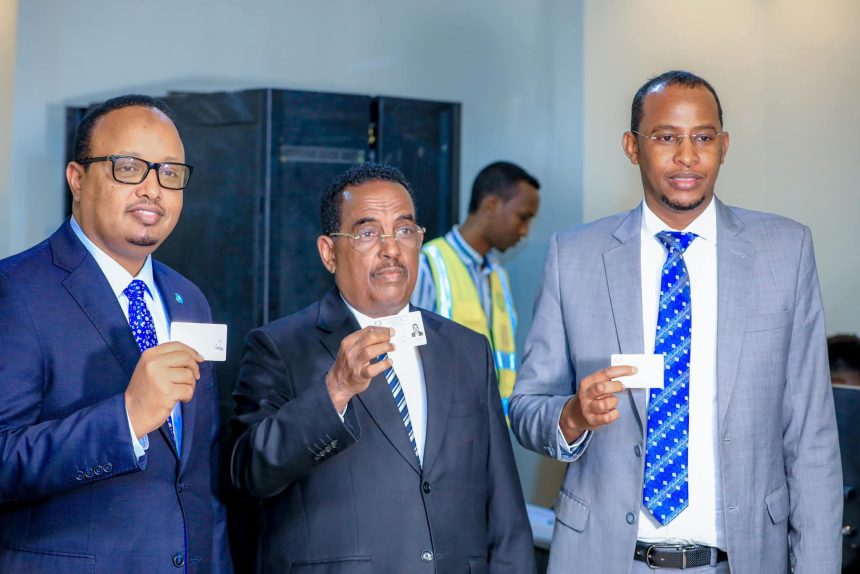Since the collapse of Somalia’s central government in 1991, the nation has endured persistent instability that severely undermined the capacity of public institutions, particularly those tasked with safeguarding national security and financial integrity. This institutional fragility has created fertile ground for criminal and terrorist organizations—most notably Al-Shabaab—to exploit regulatory loopholes and institutional gaps to fund their activities.
A central vulnerability in this context has been the absence of a standardized, verifiable, and enforceable National Identification (ID) system. In the absence of such a system, financial institutions and authorities have struggled to effectively identify account holders, detect suspicious activity, and disrupt illicit financial flows. The lack of reliable customer identification has enabled terrorist financiers and criminals to operate anonymously through banks, mobile money services, and informal remittance channels (Hawalas), threatening the integrity of Somalia’s financial system and fueling insecurity.
Rebuilding Oversight and Regulatory Capacity
Recognizing this long-standing deficiency, the Federal Government of Somalia has undertaken a series of reforms to rebuild institutional capacity and strengthen regulatory frameworks. A notable milestone was the enactment of the Anti-Money Laundering and Countering the Financing of Terrorism (AML/CFT) Act in 2016, which provided a robust legal basis to detect, monitor, and report suspicious financial activities.
However, the enforcement of AML/CFT measures has remained inconsistent—primarily due to the lack of a nationwide, enforceable identity verification system. This has significantly weakened the implementation of essential compliance mechanisms such as Know Your Customer (KYC) and Customer Due Diligence (CDD) procedures.
A Strategic Policy Shift: The July 2025 Directive
In a significant regulatory milestone, the Central Bank of Somalia (CBS), in collaboration with the National Identification and Registration Authority (NIRA), issued a directive on 29 July 2025, reinforcing the country’s efforts to safeguard the integrity and resilience of its financial system.
Effective 1 September 2025, the directive mandates that all individuals seeking to open or renew a bank account must present a valid National Identification Card issued by NIRA. This measure introduces a standardized, government-issued identification requirement across all financial institutions, thereby closing longstanding gaps in identity verification frameworks.
This directive builds upon prior guidance from the National Anti-Money Laundering Committee (NAMLC) and reflects a decisive shift in national financial policy. It aims to establish a stronger compliance environment by:
- Preventing the use of fraudulent identities in financial transactions
- Reinforcing KYC/CDD protocols across the financial sector
- Shielding financial institutions from illicit infiltration
- Empowering law enforcement and intelligence agencies to trace suspicious transactions
- Enhancing public confidence in the formal financial system
- Demonstrating Somalia’s alignment with global AML/CFT standards
The introduction of a universal National ID system is far more than a bureaucratic reform—it is a strategic counterterrorism measure. Historically, terrorist financiers exploited the anonymity afforded by Somalia’s informal financial sector to operate under aliases or false identities, enabling them to launder illicit proceeds and finance terrorist operations undetected.
The National ID system introduces a robust layer of transparency and accountability by:
- Eliminating Anonymous Access: All customers must now be verifiably identified to use banks, Hawalas, and mobile money services.
- Enabling Transaction Traceability: Every transaction is linked to a unique and verified identity, allowing for end-to-end tracking of financial flows.
- Preventing Account Multiplicity: It curbs tactics such as layering and smurfing by eliminating the ability to open multiple accounts under different aliases.
- Enhancing Risk Profiling: Financial institutions can apply data-driven assessments based on verifiable identity and transaction behavior.
- Facilitating Swift Enforcement: Authorities can rapidly freeze accounts or restrict transactions tied to terrorism financing.
By raising the cost and risk of illicit financial activity, the system directly disrupts terrorist financing networks and degrades the operational capacity of groups like Al-Shabaab.
Advancing Somalia’s Compliance with International Standards
The enforcement of a national identification requirement supports Somalia’s efforts to comply with international AML/CFT obligations—particularly those outlined by the Financial Action Task Force (FATF).
FATF Recommendation 10 specifically mandates that financial institutions identify and verify the identities of customers using independent and reliable sources of information. As Somalia undergoes its first Mutual Evaluation by the Middle East and North Africa FATF (MENAFATF), the operationalization of a National ID system is critical in addressing technical compliance and effectiveness gaps.
This initiative contributes directly to the achievement of several FATF Immediate Outcomes (IOs):
- IO4: Preventing misuse of the financial system
- IO5: Applying effective risk-based supervision
- IO6: Leveraging financial intelligence for investigations
Somalia’s commitment to this reform signals readiness to meet global benchmarks, strengthen its financial governance, and foster credibility with international partners.
Policy Recommendations for Effective Implementation
To maximize the benefits of the National ID system, the following policy and operational measures are recommended:
- Mandate National ID Across All Financial Platforms
Extend the requirement to include mobile money services, fintech firms, and informal value transfer providers. - Conduct a Nationwide Public Awareness Campaign
Collaborate with religious leaders, local media, civil society, and community networks to promote understanding of the National ID’s security and financial benefits. - Expand NIRA Accessibility
Establish mobile and regional registration centers in all regions of the country to ensure all citizens can freely and easily access National ID services. - Build Institutional Capacity
Provide targeted training for financial institutions, law enforcement, intelligence services, and regulatory authorities on leveraging the ID system for monitoring, reporting, and enforcement. - Protect Citizen Data and Privacy
Enact and enforce comprehensive data protection laws to ensure confidentiality and bolster public trust in the system.
Conclusion
The implementation of a universal National ID system marks a transformative step in Somalia’s fight against money laundering and terrorism financing. By embedding identity verification into the fabric of the financial system, Somalia not only protects its national security but also paves the way for greater financial inclusion, institutional integrity, and international cooperation.
This reform represents a strategic convergence of security, governance, and development, serving as a deterrent against financial crime and an enabler of long-term stability.
Abdiwahab Mohamed Abdirahman
Senior AML/CFT Analyst and Financial Crime Investigator
Somalia Financial Reporting Center (FRC)





